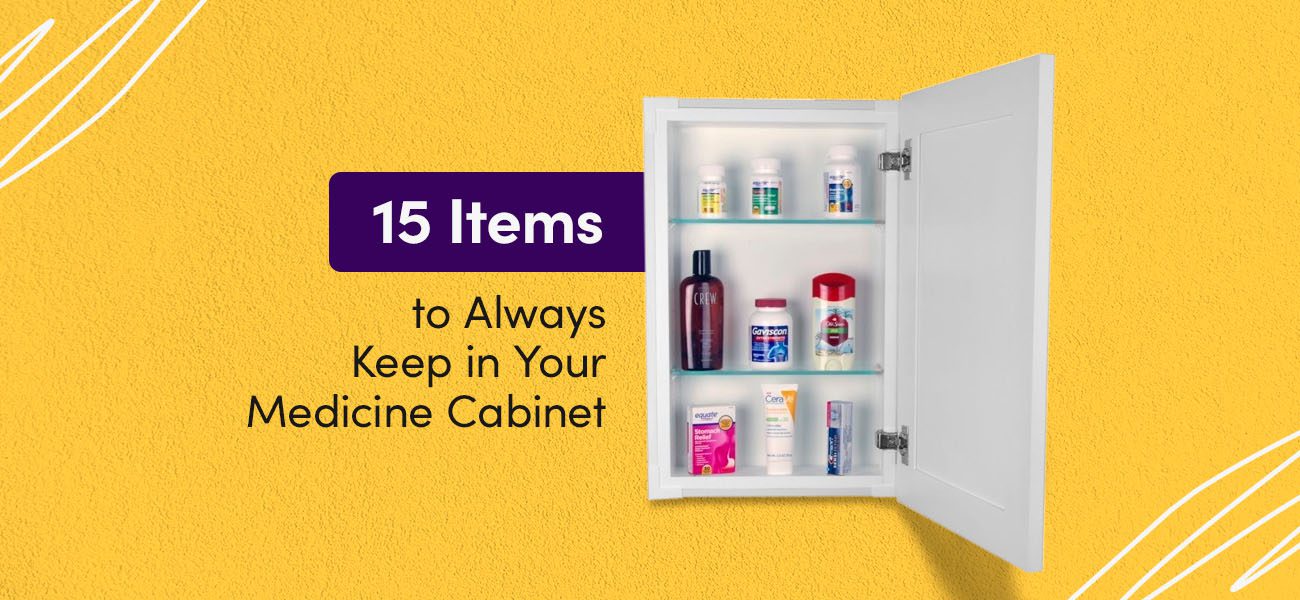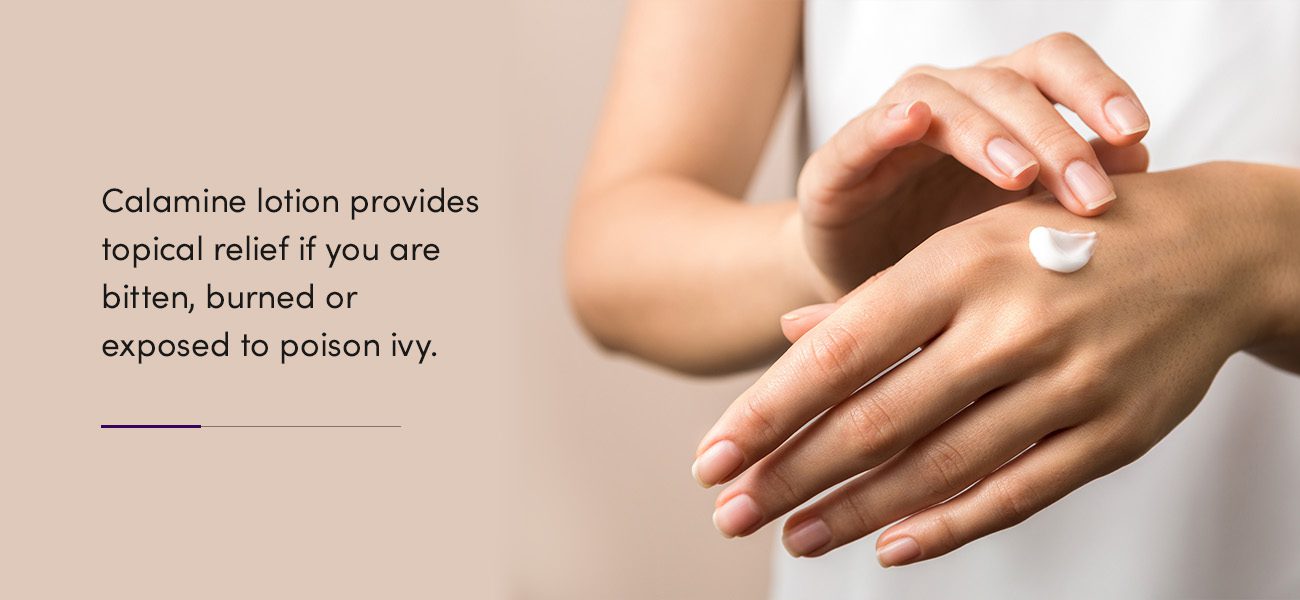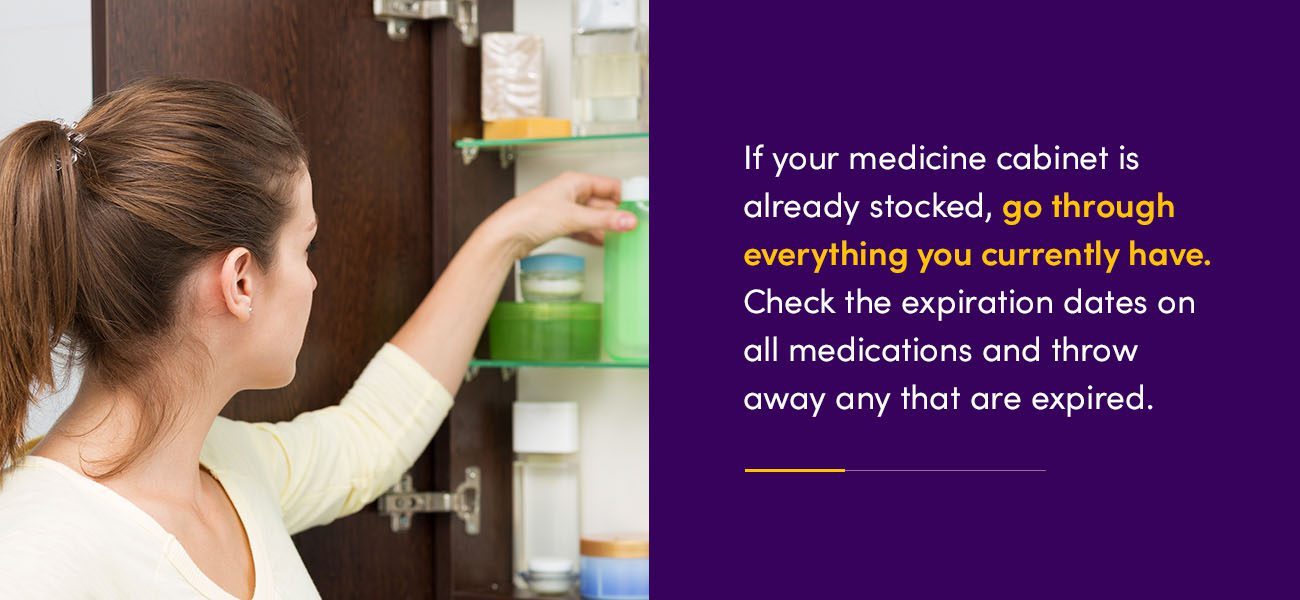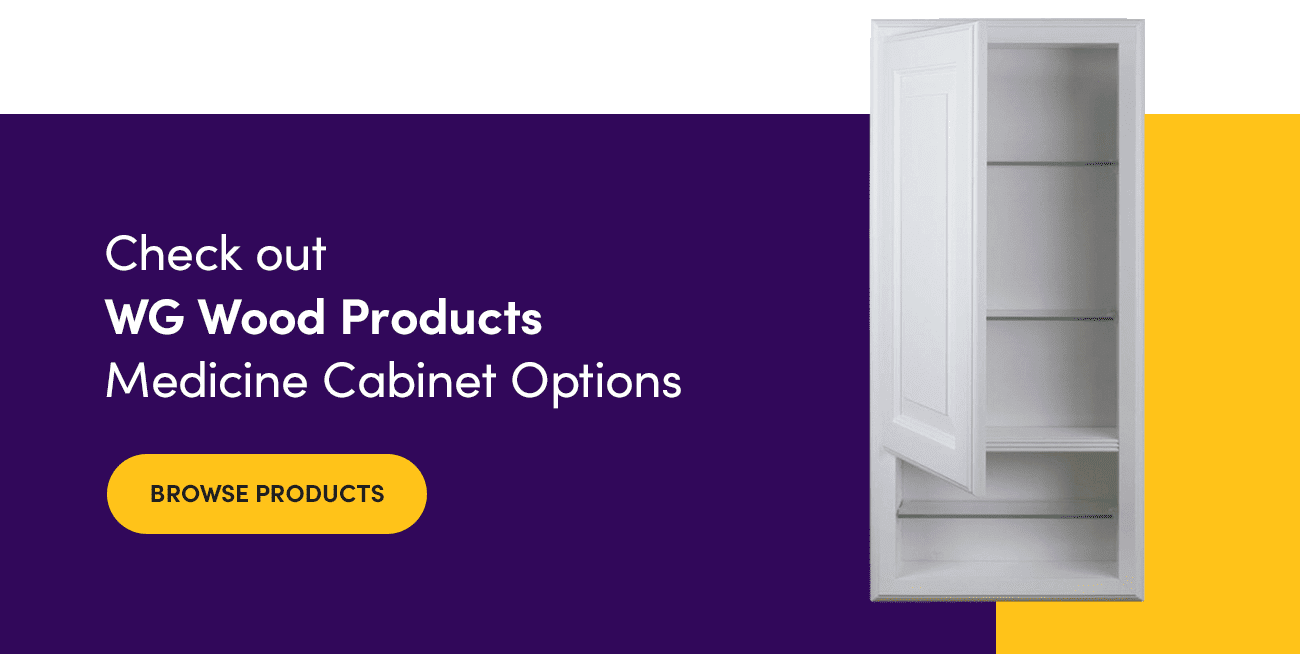The medicine cabinet in your home may be a constant oversight for you and your family if you don’t know what you should keep in it. Knowing what goes in a medicine cabinet is the first step in creating a space that holds essential products that can make your and your relatives’ lives a lot easier. Below, we’ll review how to stock your medicine cabinet and also walk you through how you can create an organized and efficient space.
15 Things You Should Keep Stocked in Your Medicine Cabinet
Broken down into two categories, there are certain medications and supplies you should be sure to have in your medicine cabinet. Making a checklist with items from both categories will prove useful if a medical situation occurs, whether minor or severe.
Below is a list of basic medicines to have at home, plus medical supplies. These are common items doctors suggest stocking your medicine cabinet with:
1. Allergy Medication
People love springtime — except for the sneezing it brings along. It can be helpful to have both a drowsy and non-drowsy antihistamine so you are prepared for allergies to strike at any time of day. Even if the members of your household don’t suffer from allergies, having allergy medication on hand can be incredibly accommodating to people visiting your home who may need it. Especially if you have pets, having medicine for guests who may be allergic to them is helpful.
Allergy medication is also essential should an emergency arise. If you, one of your family members or a guest reacts unexpectedly to a food or other substance, an antihistamine can be lifesaving.
2. Decongestant
Whether the flu, a cold or seasonal allergies are hitting you hard, being congested with no relief is not fun. Having a decongestant on hand for those stuffy days can provide relief. You can purchase a decongestant in the form of pills, liquids, nose drops and nasal sprays.
3. Pain Relievers
You can choose from numerous over-the-counter pain relievers. Though part of your choice will depend on what sort of pain relief you’re looking for, it can be helpful to have various types in your medicine cabinet for yourself, other members of your household and guests. Here are some common over-the-counter medicines:
- Acetaminophen: This pain reliever provides relief by dulling pain receptors in the brain.
- Nonsteroidal anti-inflammatory drugs (NSAIDs): In some situations, swelling at the point of injury can cause added pain and discomfort. NSAIDs help decrease swelling by lowering your body’s production of prostaglandins.
- Topical: Some pain medications can be applied directly to the skin in the form of a cream, gel, spray or patch. These topical solutions block pain receptor signals to the brain like acetaminophen does.
- Combination: Certain medications contain different types of pain relievers, like aspirin and acetaminophen, and can provide extra relief depending on the source of the pain.
4. Anti-Diarrheal
The stomach flu or other sources of stomach irritation often come out of nowhere, so having an anti-diarrheal on hand is a good idea. This is especially important if you have children or elderly people living in your home. The medicine works to slow down your gut movement.
5. Calamine Lotion
Calamine lotion provides topical relief if you are bitten, burned or exposed to poison ivy. The medicine can alleviate both itchiness and pain, and combining it with an antihistamine to reduce the severity of the reaction can be helpful.
6. Activated Charcoal
Though you hope you will never have to use this, it could be lifesaving if you do. Activated charcoal empties the stomach of all contents fast so that if someone swallows a poisonous or otherwise harmful substance, it can quickly be eliminated from the system. If this situation occurs, however, it is also important to get professional help and call 911.
7. Antibacterial Cream or Ointment
These creams and ointments can be used to prevent minor skin infections that often cause discomfort and pain. These infections are often caused by scabs, abrasions or bug bites. Ointments and creams can provide relief to fresh wounds as well, especially when used under a bandaid and left covered. If nothing else, they can speed up the recovery process.
8. Adhesive Bandages
Having adhesive bandages is important. Without them, minor wounds become a much bigger inconvenience when you don’t have something to stop the bleeding. It can also be helpful to have tape handy, as sometimes cuts are in a place that is hard to cover with a bandage. Bandaging small wounds will also protect them from getting infected, which could otherwise grow into a much more serious issue.
9. Nasal Aspirator Bulb
These are used most often for infants to help clean mucus out of their noses. The most important thing to remember with nasal aspirator bulbs is to thoroughly clean them between uses, especially if more than one member of the family is using them.
10. Thermometer
When you are sick, it is always helpful to know if you have a fever so you can better monitor your symptoms, know what kind of medicine to take and tell your doctor what your temperature has been if you end up going to a clinic. If possible, a digital thermometer is the best way to get accurate readings. With today’s technology, some thermometers work by just scanning your forehead rather than going in your mouth or under your arm.
11. Sunscreen
Applying sunscreen should be a part of everyone’s daily routine, but that is not always the case. The sun can damage your skin even on cloudy days. It can be hard to remember to wear sunscreen when you are not intentionally spending time outside, but even those brief exposures to the sun can cause damage. Many types of sunscreen are on the market, so you can easily find one that best protects your skin and lessens how it reacts to sun exposure.
Here are five reasons to wear sunscreen every day:
- Protects against ultraviolet (UV) rays: Sunscreen blocks damaging UV rays from affecting your skin. Though it is still possible to get sunburned while wearing sunscreen, sunscreen greatly decreases the risk, especially with severe sunburns.
- Lowers your risk of skin cancer: Wearing sunscreen every day cuts your risk of developing skin cancer, the most common form of cancer in the United States, by about 40% to 50%.
- Prevents premature aging: The damage to your skin caused by UV rays can cause photoaging. Applying sunscreen every day can help limit the amount of lines, sagging and wrinkles you experience as you age.
- Helps maintain even skin tone: Applying sunscreen every day can give you a more even skin tone, preventing discoloration and dark spots. It can also smooth your skin.
- Reduces inflammation: When your skin is left exposed to the sun, it can become red and inflamed, especially if you have an underlying skin condition. Wearing sunscreen can help prevent this.
12. Tweezers
Tweezers come in handy for numerous uses. Cosmetically, they are helpful to pluck eyebrows. They are also essential for quickly and painlessly removing a splinter or a tick. Tweezers come in various shapes and sizes, so you can buy a pair that’s best suited for your needs and what you expect to use them for most often.
13. Elastic Joint Supports
Joint supports can come in handy if a minor orthopedic injury happens to someone in your household. Elastic supports come in a wrap format so they can be utilized for different joints. This format also keeps you from investing in several supports to have on hand for various injuries that could occur. These can also be helpful for anyone in your household who experiences chronic joint pain to some degree.
14. Hydrogen Peroxide
Hydrogen peroxide is a substance you can use in various situations, making it essential for your medicine cabinet. Whether you have a minor cut, scrape, burn or even a new piercing, this mild antiseptic can help prevent infection. You can also use it for sources of minor mouth irritation like canker sores or gingivitis. Follow the instructions when using it for anything to ensure safety.
15. Eyedrops
Though there likely won’t be many serious situations in which you need eyedrops, when you do need them, it’s often because your eyes are uncomfortable. Whether something gets stuck in your eye, your contact dries or your allergies cause your eyes to be itchy, eyedrops are handy to have around.
How Do You Organize a Medicine Cabinet?
Learning how to stock your medicine cabinet with all the things listed above can seem overwhelming at first, but doing so will make your life much easier. You can take several approaches to organizing your medicine cabinet. Some depend on whether you already have a stocked medicine cabinet or if you’ve just gotten a brand-new one.
Consider using these tips to keep your space organized and neat:
Clear out Your Medicine Cabinet
If your medicine cabinet is already stocked, go through everything you currently have. Check the expiration dates on all medications and throw away any that are expired. Though some medications will not hurt you if you take them after their expiration date, others could have developed bacteria, which could lead to a more serious infection or antibiotic resistance. On the other hand, they may just simply not work the way they are supposed to, which will be of more inconvenience to you than harm unless it is an emergent situation.
Consider How You’ll Use These Items
Think about how you use certain products that you are considering storing in your medicine cabinet, and account for this list of considerations:
- Packaging: Is a product you want to add to your cabinet in a big, bulky package? This may make it difficult to store in your medicine cabinet, or it could take space away from something more valuable.
- Frequency of use: How often do you need this product? When do you need it throughout the day? These questions will help you decide if it would be beneficial to put the item in the medicine cabinet or store it below your sink or in a different cabinet or closet.
- Type of product: Your medicine cabinet is likely sitting above your sink and may have a mirror on the front. Think about if the product is something you need to be at the sink or mirror to use. This will help you determine if it is best placed in the medicine cabinet or elsewhere.
- Size: Most medicine cabinets have narrow shelf space. If you are not sure about a particular product, it may be worth measuring it to see if it would even fit in your cabinet, which can speed up your decision. If you really want a certain item in your cabinet but are having trouble getting it to fit, consider buying a small storage container and placing the product in that instead of its original packaging.
- Conditions: Do your research on your medical supplies and know what conditions different medications in your cabinet can and cannot be exposed to. If they should be kept away from heat and humidity, consider storing them somewhere where they won’t be exposed to the shower’s heat and steam.
Make a List
As you go through these options, it can be helpful to create a checklist of items you want to put in your medicine cabinet, which will save you time when you begin organizing things. You could also make other lists of areas where products could be placed, like under the sink or on other shelves, so you can visually see which possible locations you are working with.
Begin Organizing
Once you know exactly what you want to have in your medicine cabinet, consider how you’ll organize it. Come up with a system that works well for you and the members of your household. You can invest in helpful organization tools like a pill organizer, small containers or empty spray bottles. You could also add a whiteboard inside the medicine cabinet with your organization system written on it to help the space stay as neat as possible.
Check out WG Wood Products Medicine Cabinet Options Today
A clean, organized and spacious medicine cabinet is far more than an attractive piece in your bathroom for convenience’s sake. In some situations, certain medicines and supplies could be lifesaving. Knowing exactly where they are in your medicine cabinet could save you critical minutes in an emergency so that you and your relatives get the help you need, when you need it.
On the wall wood cabinets and recessed cabinets from WG Wood Products provide you with numerous options so you can find the medicine cabinet that’s best suited for you, your family and your available bathroom space. We also allow our clients to customize their products to better fit their needs and design preferences, all at no extra cost.
Browse through your options on our website if you are considering replacing the medicine cabinets in your home or adding new ones. Contact us for more information on how we can help you customize the ideal cabinets, or ask about any questions you may have.





